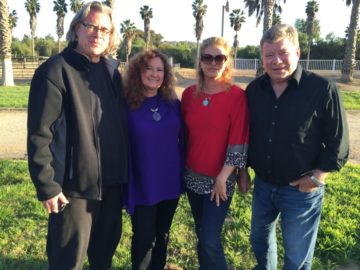
In this issue of the Eponaquest News, Linda Kohanov shares highlights from her visit with actor, director, author, and dedicated horseman William Shatner. She also offers the latest news on her upcoming tour and her new book.
Shatner’s World: Horses are an Important Part of it
Many people are surprised to learn that William Shatner was a horse enthusiast long before he rose to fame as Star Trek’s Captain James T. Kirk. Growing up near Montreal, Canada, Bill would wistfully watch other lucky people interact with their horses at a local boarding stable. “I remember going there all the time and having this sort of innate interest in riding, which I couldn’t fulfill at the time because of the expense involved,” he revealed in Cowboys and Indians magazine. “But I was just drawn there anyway — hanging around the rental stables without ever actually getting on a horse.”![Shatner as Alexander[2] (2)](https://eponaquest.com/wp-content/uploads/shatner-as-alexander2-2-360x277.jpg)
In 1964, Bill jumped at the chance to study bareback riding when he won the role of Alexander the Great, a legendary horseman well known historically for gentling an aggressive stallion and gaining the powerful horse’s self-sacrificing loyalty in battle.
Over 50 years after this TV movie was filmed, Bill is riding at a level that would have made the original Alexander proud. In fact, Bill told me that he feels he’s riding better than ever, in large part because he’s taking the mental, emotional and spiritual dimensions of the art form into consideration. As a result, he’s forming deeper, more intuitive relationships with his horses.
A Unique Opportunity
I had the amazing honor of being invited to be a part of the celebrated actor, director, and author’s 85th birthday celebration on March 22. It turns out that Bill has read my book Riding between the Worlds three times, and is intrigued by the consciousness expanding potential of the horse-human bond.
His wife Elizabeth and I had met during a 2013 conference at BraveHearts Therapeutic Riding and Educational Center outside of Chicago, IL. Liz is a talented horse trainer who started a non-profit to support animal-assisted therapy for military personnel and their families. See http://www.allgloryproject.com/ We have many shared interests and have kept in touch. But I was still surprised when Liz asked if my husband Steve Roach and I could join them for Bill’s birthday last month, and offer a taste of the equine-facilitated work for their family and friends.
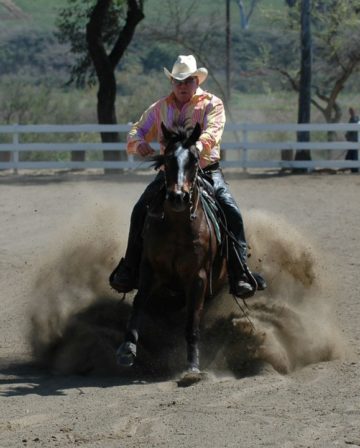
An Impressive Legacy
Bill is an athletic rider who wins reining competitions on horses that I would easily fall off of in the first five minutes of all those sliding stops, spins, and sudden canter departs. It was truly stunning to see him race around on his beautifully trained horses at a scenic facility outside Los Angeles. We also watched his longtime trainer Danny Gerdardi ride a particularly talented and promising member of the herd.
In addition to their enthusiasm for reining horses, Bill and Liz raise and show 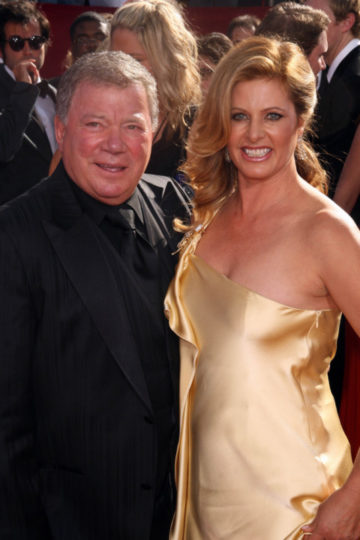 Saddlebreds, and sometimes they find themselves competing with each other. Along the way, Bill became instrumental in introducing the Western Pleasure division to the Saddlebred world. For the last 24 years, he has hosted the Hollywood Charity Horseshow to raise funds for a variety of children’s charities. (If you are interested in attending or contributing to the June 4 event, see http://www.horseshow.org/ )
Saddlebreds, and sometimes they find themselves competing with each other. Along the way, Bill became instrumental in introducing the Western Pleasure division to the Saddlebred world. For the last 24 years, he has hosted the Hollywood Charity Horseshow to raise funds for a variety of children’s charities. (If you are interested in attending or contributing to the June 4 event, see http://www.horseshow.org/ )
One Man Show
In his well-received, multi-media, one-man show Shatner’s World, Bill shares anecdotes, songs, jokes, and poignant moments that trace his sometimes rocky, always inspirational path from classically trained Shakespearean actor to cultural icon. Along the way, he talks about the important role that horses have played in his life.
I was excited to see that his upcoming tour includes an appearance in Tucson next Friday May 6 at the Fox Theater downtown. For tickets: https://foxtucsontheatre.ticketforce.com/eventperformances.asp?evt=769#
There are several other dates coming up in various cities: including shows in Brooks, CA and Bakersfield, CA the following two nights. European audiences will be pleased to know that he’s traveling to Germany May 13 and Italy May 20. For more information on these events, check out his website http://williamshatner.com/ws/bills-appearances/
Film Directors as Leaders
Bill, Liz, Steve and I discussed a wide range of subjects during the three days we spent with this remarkably energetic couple. Among a number of intriguing topics, we looked at how various Hollywood directors and producers fit into The Five Roles of a Master Herder model.
In Chapter Four: “Discover and Inspire,” I observe that:
Artistic fields are particularly susceptible to hiring immature leaders with a compelling vision. In the 2014 documentary Lost Soul: The Doomed Journey of Richard Stanley’s Island of Dr. Moreau, the filmmakers capture, with amusing yet agonizing precision, a sweet, creative, optimistic writer-director enacting all the classic challenges of someone who over-emphasizes the Leader role.
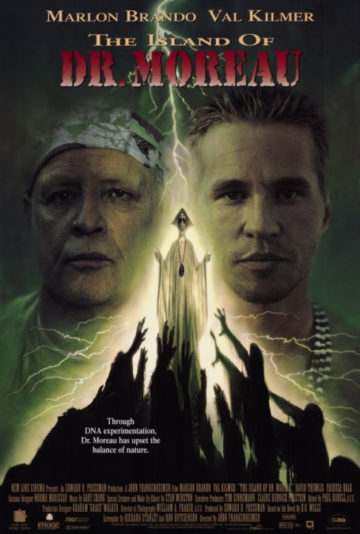 After previous success in creating campy horror films that gained a cult following, Richard Stanley was given the chance to develop a mainstream Hollywood movie based on one of his favorite books. Over time, however, he proved incapable of juggling the myriad organizational details, special interests, and massive egos involved. While most leaders have access to at least some of the strengths of one or two other roles, Stanley’s sometimes amusing, sometimes heartbreaking story offers a dramatic case study of a man who truly lacked proficiency in the Sentinel, Nurturer/Companion, Dominant, and Predator roles. With little more than an intriguing vision and the nerve to manifest it, Stanley’s failure is almost guaranteed, despite a multi-million dollar budget and a cast of legendary actors. (Page 106)
After previous success in creating campy horror films that gained a cult following, Richard Stanley was given the chance to develop a mainstream Hollywood movie based on one of his favorite books. Over time, however, he proved incapable of juggling the myriad organizational details, special interests, and massive egos involved. While most leaders have access to at least some of the strengths of one or two other roles, Stanley’s sometimes amusing, sometimes heartbreaking story offers a dramatic case study of a man who truly lacked proficiency in the Sentinel, Nurturer/Companion, Dominant, and Predator roles. With little more than an intriguing vision and the nerve to manifest it, Stanley’s failure is almost guaranteed, despite a multi-million dollar budget and a cast of legendary actors. (Page 106)
Triple Threats
Yet as Bill and I discussed, even producers and directors who manage to juggle three of the five roles face predictable yet infuriating—and expensive—challenges handling the many personalities involved in these complex projects. From descriptions Bill offered, I could see that Star Trek creator Gene Roddenberry offered a classic case study of an unbalanced leader who wielded a particularly ambitious yet often destructive combination of roles that I call the “power triumvirate.” In Chapter 8: “Growing Pains,” I cite Steve Jobs as a well-known example of the same inclination:
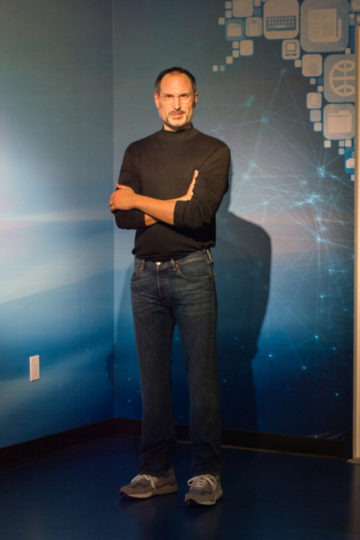 Jobs was a visionary who, as many commentators have observed, let nothing stand in his way. By shrewdly combining the roles of Leader, Dominant, and Predator, he intimidated, alienated, and sometimes outright betrayed colleagues, friends, and family members. Wielding a double-edged sword of single-mindedness, he made sometimes creative, sometimes devastating decisions that won, then lost, Apple millions of dollars, and eventually, Jobs’ own job with the company. His comeback was admirable, and his influence undeniable, but in promoting this intelligent yet still unbalanced innovator as a model of “ultimate success,” it’s clear that public standards for greatness are still too low.
Jobs was a visionary who, as many commentators have observed, let nothing stand in his way. By shrewdly combining the roles of Leader, Dominant, and Predator, he intimidated, alienated, and sometimes outright betrayed colleagues, friends, and family members. Wielding a double-edged sword of single-mindedness, he made sometimes creative, sometimes devastating decisions that won, then lost, Apple millions of dollars, and eventually, Jobs’ own job with the company. His comeback was admirable, and his influence undeniable, but in promoting this intelligent yet still unbalanced innovator as a model of “ultimate success,” it’s clear that public standards for greatness are still too low.
A truly great man must be a good man, or he leaves a swath of pain, confusion, and unnecessary destruction in his wake that people who value freedom should neither tolerate nor emulate. In any worthwhile endeavor, experimentation must take place; mistakes must be made; some things must be nourished; other things must be culled. But a visionary leader must also respect, empower, and negotiate with his followers and constituents or he becomes little more than a dictator with a good idea.
Ambitious men and women are most likely to embrace the same “power triumvirate” that Jobs employed with such calculating efficiency: that age-old habit of emphasizing skills associated with the Leader, Dominant and Predator roles, while neglecting the Nurturer/Companion’s compassionate interpersonal genius and Sentinel’s steadfast, noble guardianship. As such, many people lauded as contemporary success stories are simply pharaohs and conquistadors dressed up in Armani suits: visionaries striving to build the next great architectural wonder, explore new territory, or search for gold at the expense of thousands of serfs and “common” workers. (Pages 163-64.)
In his autobiography, Up Till Now, Shatner shares stories exemplifying how Roddenberry’s brilliant ideas contrasted with his tendency to combine the Dominant and Predator roles in ways that severely compromised his ability to work effectively with others. The Star Trek creator was so destructive at times, Bill told me, that the studio would promote Roddenberry to get him off the set. “It happened several times,” Bill said, shaking his head, still marveling at the persistence of this bizarre pattern: After the original television series ended and the crew dispersed, studio executives in charge of producing the first Star Trek movie didn’t know about Roddenberry’s complex personality. So they brought him back, encountered the same unproductive behavior on the film set—and, once again, promoted him to a kind of executive producer emeritus status. Then when the Star Trek: The Next Generation TV series was conceived, the same cycle was repeated. In the documentary Chaos on the Bridge, Bill explores the intricate difficulties arising from Roddenberry’s confusing, eternally frustrating amalgamation of visionary genius combined with a debilitating lack of social intelligence and innovative leadership abilities. It’s a wild and fascinating ride!
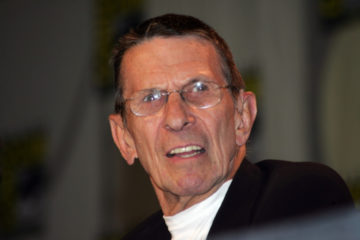 In Shatner’s latest book, Leonard, on the other hand, Bill’s descriptions of Leonard Nimoy’s approach to directing suggest that the man who once played an emotionless Vulcan effectively employed a reserved yet still caring use of the Nurturer/Companion role to gain the trust and respect of his actors. While he wasn’t a perfect leader, Bill told me, Nimoy’s style was much more balanced, and consequently, effective.
In Shatner’s latest book, Leonard, on the other hand, Bill’s descriptions of Leonard Nimoy’s approach to directing suggest that the man who once played an emotionless Vulcan effectively employed a reserved yet still caring use of the Nurturer/Companion role to gain the trust and respect of his actors. While he wasn’t a perfect leader, Bill told me, Nimoy’s style was much more balanced, and consequently, effective.
Our conversation about film directors and producers subsequently led to an intriguing discussion of how certain politicians insist on overemphasizing the Dominant and Predator roles, while also lacking in visionary leadership skills. Out in the “real world,” this “double threat” holds dangerous consequences that are much more alarming than those one might encounter on a film set.
As for William Shatner himself? I didn’t glimpse what roles he emphasizes or avoids in his professional life. But I was very touched by how he energized and engaged with family and friends—both two- and four-legged. At the same time, he and Liz were generous hosts, filled with an obvious love of life and each other.
At 85, Bill is intelligent and eternally inquisitive, gracious and vivacious, a true force of nature, the kind of man who could easily live to be 100!
 Tour Dates
Tour Dates
I’m still firming up dates for a summer tour in support of my new book and will announce a full schedule soon. In the meantime, workshops in Buffalo, NY in June http://eponaquest.com/workshop/5-roles-ny/ and Sebastopol, CA (near San Francisco) in July http://eponaquest.com/workshop/5-roles-california/ are posted on the website. (The June workshop in Toronto, CA is already filled.)
I’m also honored to be the keynote speaker at the upcoming Healing with Horse Collective’s fourth annual Symposium near Dallas, Texas, May 26 through 30. I will be doing a one-day indoor workshop on The Five Roles of a Master Herder on May 26. Participants will take, and learn how to interpret, the Professional Assessment that shows which roles they tend to emphasize, overemphasize, or avoid. We will also learn how to balance these roles in our professional and personal lives. Then on Friday, May 27, I will offer a keynote on the transformational power of the human-animal bond. Saturday I will demonstrate the Eponaquest approach to equine-facilitated learning. Other leaders in the field will be joining us. For more information and to register:
http://www.healingwithhorse.org/symposium-registration/
Audiobook, Pre-orders, and Endorsements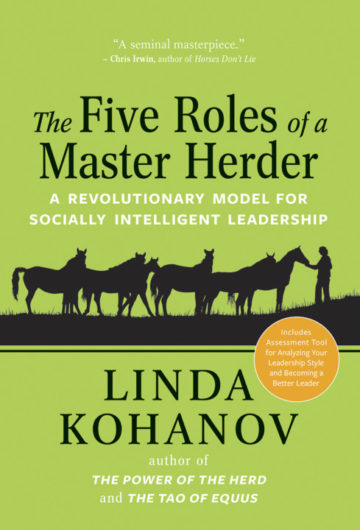
An audio version of The Five Roles of a Master Herder will be released at the same time as the hardcover. Several people have asked if I will be reading it. My intense schedule doesn’t allow me to take the time to produce such a project, so I’m thrilled that a professional narrator is undertaking this task.
My editor, Jason Gardner, worked very hard to move up the book’s July publication date to early June so that it would coincide with my trip to New York and Toronto that month. In the meantime, you can pre-order it on Amazon at
http://www.amazon.com/Five-Roles-Master-Herder-Revolutionary/dp/1608683389/
And finally, I was deeply touched by the wonderful endorsements the book received from several respected authors. Here are the comments that will appear on the back cover:
“An innovative and practical nature-based approach to leadership — and life. This book is not just for corporate executives. Parents, teachers, community organizers, film directors, and especially politicians would all benefit from learning these skills.”
— William Shatner, actor, director, and author of Leonard and Up Till Now
“As a trauma specialist, I help people recover from abuse and criminal acts. Over the years, I’ve learned that empowered families are crucial to protecting their loved ones to begin with, for helping survivors of extreme experiences heal, and for leading the kind of cultural change that prevents violence. The Five Roles of a Master Herder provides a template for all adults to reclaim their power and use it wisely, at work and, perhaps more importantly, at home.”
— Rebecca Bailey, PhD, psychologist and author of Safe Kids, Smart Parents
“Linda Kohanov presents an intriguing model for human organizations adapted from those found among animals. This beautifully written book is an important addition to the literature on self-actualization, leadership, and natural horsemanship.”
— Rick Lamb, PhD, author of Human to Horseman
“When Rick Lamb and I coauthored our 2005 book, The Revolution in Horsemanship, I didn’t fully appreciate our subtitle (And What It Means to Mankind), especially as it pertains to the corporate business world. This book, however, made me aware of how an understanding of interspecies animal behavior can powerfully affect our lives today.”
— Robert Miller, DVM, veterinarian, teacher, and coauthor of The Revolution in Horsemanship
“A seminal masterpiece, Linda Kohanov’s The Five Roles of a Master Herder is a treasure of enlightened insights on how the nature of horse sense can help us find our balance between the lion and the lamb. Far beyond mere feel-good metaphors and self-help clichés, Kohanov clearly defines how nonpredatory power can lead to an evolved level of emotional heroism and the genuinely empathetic emotional intelligence needed to heal a world suffering a crisis of predatory leaders. A must-read for anyone looking to light the way forward in a darkening, increasingly out-of-control world.”
— Chris Irwin, author of Horses Don’t Lie and Dancing with Your Dark Horse